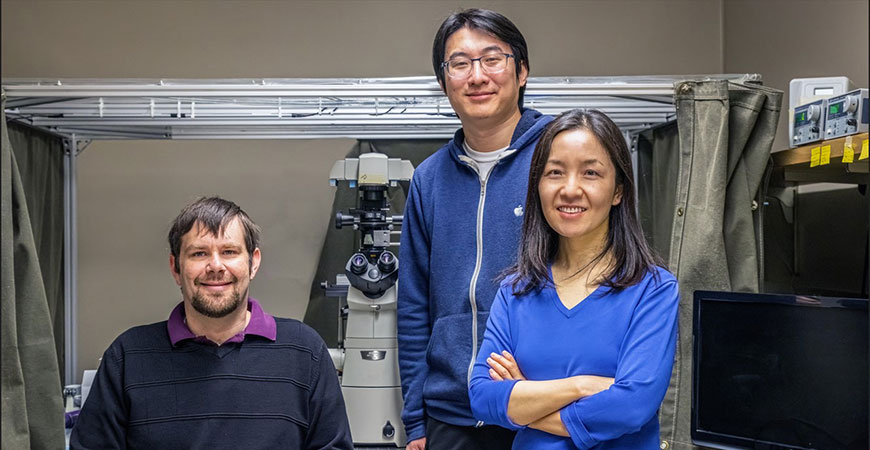
Student researchers in experimental physics Professor Jing Xu’s lab have played a critical role in a study that will help understand Alzheimer’s and other diseases that progressively destroy brain tissue.
Three students, including a graduate student who has since completed his Ph.D. and an undergraduate student who graduated, are among the authors of a paper that reveals the results of their study and points to a possible therapeutic for neurodegenerative diseases. The paper was published in the Proceedings of the National Academies of Science.
Alzheimer's disease is, so far, untreatable and incurable and is the sixth-most common cause of death in adults in the United States. An estimated 5.7 million people have the disease. Dysfunction of a protein called tau is the marker of Alzheimer’s disease.
Xu’s lab works to understand how cellular cargos navigate around high levels of tau proteins on microtubules to keep the cells healthy, rather than degenerating.
For this study, Xu and her students used optical trapping (a method that won Nobel prizes in physics in 1997 and 2018) to determine how the physical properties of a lipid cargo membrane affect kinesin-based transport in the presence of tau. Kinesins are biological motor proteins that function as highways within cells as they allow for the transport of all kinds of cellular cargo. Xu is a member of the Health Sciences Research Institute (HSRI), and the research for this study was funded by a National Institutes of Health (NIH) R15 grant managed by HSRI.
Qiaochu “Michael” Li, Ph.D., the alumnus who is now a senior software engineer at Apple Inc., is the lead author on the paper that indicates cargo membrane cholesterol could be a therapeutic target to mitigate transport dysfunctions that are a common early hallmark of aging and neurodegeneration.
“I was surprised by the result because tau is essential for microtubule assembly and stabilization but obstructs kinesin-binding sites,” Li said. This was the fourth paper resulting from his Ph.D. work in the Xu lab, and the third in which he is the lead author. It is the first to be published after his 2018 graduation. He helped design the experiments used in the study, carried out the experiments and helped analyze the data.
“These are difficult experiments to do and difficult to measure,” Xu said, “even for someone like me, who has been trained in the subject for 15 years. At the time we did this work, there were only two research groups that had published in this area. It was just tremendous work that Michael did. He has lots and lots of patience and has, as we say in our field, good hands.”
Li’s lab work included taking glass beads no wider than 1/20th of a strand of hair and coating them in a thin layer of fat that had the right composition to mimic changes in the cellular membrane associated with aging. He had to incubate the beads with kinesin motor proteins, and use a custom-built optical trap — a highly focused laser spot that interacts with the glass bead — to move individual beads near a microtubule so the researchers could capture videos to track their binding and progress. Each of those videos was then analyzed frame by frame using image processing and particle tracking software.
Of the other two student researchers on the paper, Luis Arteaga-Castaneda graduated in 2020 with a bachelor’s of science degree in physics and graduate student John O. Wilson will defend his Ph.D. thesis in Physics in May.
Xu said the student researchers in her lab are important and that because of the work they do together they are able to add to the body of knowledge about neurodegenerative diseases and potential treatments.
“All three student researchers are first-generation, and one is from an underserved community. Michael is the first in his family to graduate from college and the first to earn a Ph.D. in Physics. Our study showcases the kinds of research experiences and discoveries students can have here at UC Merced,” she said.






